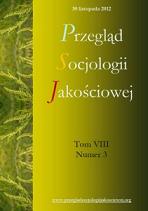Family Changes in Iranian Kurdistan: A Mixed Methods Study of Mangor and Gawerk Tribes
Family Changes in Irania Kurdistan: A Mixed Methods Study of Mangor and Gawerk Tribes
Author(s): Mehdi Rezaei, Rasoul Sadeghi, Juliet Corbin, Ahmad MohammadpurSubject(s): Social Sciences
Published by: Uniwersytet Łódzki - Wydział Ekonomiczno-Socjologiczny
Keywords: Family Changes; Modernization; Mixed Methods Research; Grounded Theory; Mangor and Gawerk Tribes
Summary/Abstract: Over the last few decades, the Iranian Kurdish society, including family and kinship systems, has experienced enormous changes as a result of government implemented modernization efforts. This paper reports the results of a quantitative/ qualitative mixed methods study aimed at exploring (a) the nature of change in family and kinship systems and (b) how people understand and interpret these changes. The sample for this study was drawn from the Mangor and Gawerk tribes residing in the Mahabad Township located in the West Azerbaijan Province of Iran. Using standardized questionnaires, 586 people were sampled as part of the quantitative portion of the study. For the qualitative portion, data was collected on 20 people using both in-depth interviews and participant observations. The quantitative data was analyzed by SPSS software and the qualitative data was interpreted using grounded theory procedures. The quantitative findings showed that the urbanization, modern education, and mass media have all contributed to the emergence of a new form of family and kinship life. In addition, while supporting quantitative findings, the qualitative results revealed that participants were aware of and sensitive to sources, processes, and effects of modernization on their family and kinship life.
Journal: Przegląd Socjologii Jakościowej
- Issue Year: VIII/2012
- Issue No: 3
- Page Range: 76-96
- Page Count: 21

